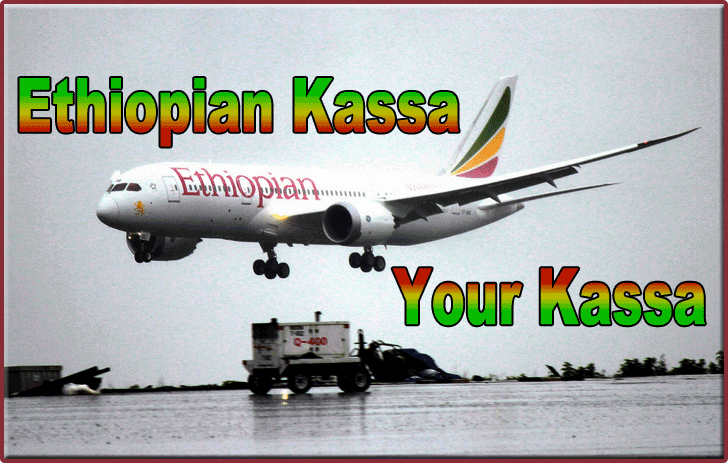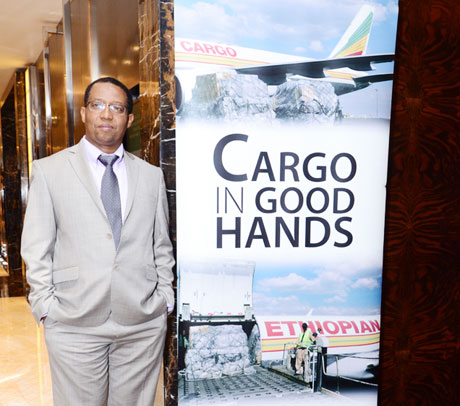
“India
has a special place for Ethiopian Airlines’ cargo
business,” said Berhanu Kassa, Director Global
Cargo Sales & Services, Ethiopian Airlines Cargo,
when he was recently in Delhi to meet cargo agents and
thank them for their business in 2015.
ACNFT managed
to get him away from his meeting to find out Ethiopian’s
cargo plans in general and India, in particular. Pointing
to his airline’s age-old contacts with India,
he said, “Ethiopian Airlines has been in India
for over 40 years, connecting the sub-continent to all
African nations in its wide network.
“Hence, India
has a special place for Ethiopian Airlines’ growth
and its global presence.”
Lifting
18 Tons Weekly
Kassa began by saying that currently Ethiopian was systemwide
transporting internationally an average of 18,000 tons
on freighters and 6,500 tons in belly per month.
As for India, he said,
“Ethiopian uplifts an average of 300 tons from
Mumbai and 50 tons from both Delhi and Chennai per week.”
He was quick to add
that the “traffic has seasonal variances, but
there has been a steady growth over the years,”
but import volumes were insignificant.
Lion
Of Africa
For the lion of Africa—as Ethiopian would like
to be known—India plays a very important and strategic
role. The country has had relations with African nations
for many years and with the recent improvement in Indo-African
ties, Ethiopian Airlines views India as a huge source
of its future revenues. Trade between the two nations
has risen over the years, approaching $1 billion by
2015 from $660 million in 2011-12.
It is at such a juncture
that Ethiopian Airlines has said that it would partner
with its Star Alliance fellow member, Air India, to
expand its business in the country.
 Expansion
Strategies Expansion
Strategies
The carrier has, in fact, charted out two expansion
strategies to improve connectivity of Indian market
to Africa and the world. In the first one, it
is planning to increase frequency and upgrade capacity
to current online destinations.
The second involves
working to revise the bilateral relations, which would
open avenues for expanding operations to other major
Indian metro cities besides Delhi and Mumbai.
Kassa mentioned that
the carrier had been “operating daily flights
from Delhi and Mumbai and both our routes are doing
well, and we had an average load factor of more than
75 percent on both routes.
“We are aiming
for much better performance in 2016 and have been seeing
good results in the last few months.”
Freighters
Rising
Speaking about cargo and the freighter flights to India,
Kassa said Ethiopian has been serving Delhi with twice-weekly
B777 freighter schedules (the flight operates the Shanghai-Delhi-Addis
route).
“The flight shares
40 percent of its capacity for Delhi to uplift cargo
mainly to African destinations,” he said, mentioning
that “the frequency can grow further based on
increasing demand.”
The cargo chief went
on to state India's contribution to Ethiopian’s
global presence. “Indian products like garments,
fabrics, industrial products, and medicines are consumed
across African countries.”
As part of its India
strategy, Ethiopian has targeted Bangalore to be the
next freighter destination.
“Flights have
been planned and services will start in the first week
of November 2015,” Kassa said.
Having talked about
the India market, Kassa moved on to the ambitious vision
the airlines had charted out in November 2010: “With
the increasing capacity in terms of fleet and the cargo
facility, we are confident that we are on a good track
to meet our target of 725,000 tons yearly uplift by
2025. Our year-round uplift for the year ending June
2015 was a record: 290,000 tons,” he said.
Ethiopian’s fleet
too is shaping up: “We have six B777s and two
B757s.
“The B777 freighters
are used for long haul services like Europe, Far East,
and Indian Sub-Continent, while the B757 are used to
cover Gulf and African destinations,” he said.
“The freighters
will serve 30-odd international destinations with Hong
Kong, Shanghai, Delhi, Chennai, Mumbai, Dubai, and Liege
(Belgium) being the major ones outside Africa, and Johannesburg,
Kinshasa, and Brazzaville the top stations in Africa.”
Building
Bole?
The airline plans to reach its target of 725,000 tons
will not be possible with the existing cargo terminal
at Bole International Airport in Addis Ababa.
As Kassa pointed out:
“The existing
cargo terminal has become small to accommodate the growing
cargo traffic.
“The new expansion
will provide a total of 1.2 million tonnage capacity
per year, which is four times larger than the existing
facility. ‘The first phase of the expansion will
be completed in the next 12 months and will offer additional
cold room facility to cater to local perishable exports
such as flowers, fruits and vegetables, meat, and for
transiting temperature-sensitive products.”
Additionally, Kassa mentioned that “cargo agents
will have enough office and working space to expand
their business and facilitate services.”
One of the two cold
room facilities in the existing terminal is used exclusively
to handle flowers, fruits, and vegetables. “These
products,” said Kassa, “are exported to
Europe and the Middle East. This can accommodate two
B777 freighter loads at a time. The second cold room
is used mainly to handle meat exports and for storage
of other temperature-sensitive products, including pharma,”
said Kassa.
Tirthankar
Ghosh |



